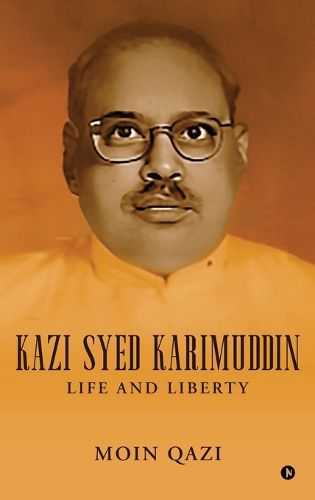Readings Newsletter
Become a Readings Member to make your shopping experience even easier.
Sign in or sign up for free!
You’re not far away from qualifying for FREE standard shipping within Australia
You’ve qualified for FREE standard shipping within Australia
The cart is loading…






This title is printed to order. This book may have been self-published. If so, we cannot guarantee the quality of the content. In the main most books will have gone through the editing process however some may not. We therefore suggest that you be aware of this before ordering this book. If in doubt check either the author or publisher’s details as we are unable to accept any returns unless they are faulty. Please contact us if you have any questions.
Vidarbha, in Maharashtra's north-eastern region, has been fertile ground for social reformers and intellectuals. It has played a vital role in shaping the nation, with its social, cultural, and political currents enriching India's civilization. One such luminary from Yavatmal was Kazi Syed Karimuddin, a distinguished criminal lawyer who played a critical role in drafting the Indian Constitution.
Karimuddin actively engaged in Yavatmal's social, legal, judicial, and political circles. He participated in the Constituent Assembly (1947-50), framing the Constitution, and served in the Madhya Pradesh Legislative Assembly (1947-52) when it was known as the Central Province. Later, he was a Rajya Sabha member (1954-58). He earned a law degree from Aligarh Muslim University and became a notable litigator in privacy, emergency provisions, and proportional representation.
Karimuddin proposed an amendment in the Constituent Assembly, modeled after the American Constitution, to make the right to privacy a fundamental right. However, Dr. B.R. Ambedkar only offered reserved support. Article 20 states that no person shall be convicted except under a law in force at the time of the act, prosecuted twice for the same offence, or compelled to be a witness against themselves.
This book outlines Karimuddin's remarkable career as a criminal lawyer and a pioneer of the right to privacy. It traces the journey of privacy rights from his amendment to the Puttaswamy case, which extensively shaped its legal framework.
$9.00 standard shipping within Australia
FREE standard shipping within Australia for orders over $100.00
Express & International shipping calculated at checkout
This title is printed to order. This book may have been self-published. If so, we cannot guarantee the quality of the content. In the main most books will have gone through the editing process however some may not. We therefore suggest that you be aware of this before ordering this book. If in doubt check either the author or publisher’s details as we are unable to accept any returns unless they are faulty. Please contact us if you have any questions.
Vidarbha, in Maharashtra's north-eastern region, has been fertile ground for social reformers and intellectuals. It has played a vital role in shaping the nation, with its social, cultural, and political currents enriching India's civilization. One such luminary from Yavatmal was Kazi Syed Karimuddin, a distinguished criminal lawyer who played a critical role in drafting the Indian Constitution.
Karimuddin actively engaged in Yavatmal's social, legal, judicial, and political circles. He participated in the Constituent Assembly (1947-50), framing the Constitution, and served in the Madhya Pradesh Legislative Assembly (1947-52) when it was known as the Central Province. Later, he was a Rajya Sabha member (1954-58). He earned a law degree from Aligarh Muslim University and became a notable litigator in privacy, emergency provisions, and proportional representation.
Karimuddin proposed an amendment in the Constituent Assembly, modeled after the American Constitution, to make the right to privacy a fundamental right. However, Dr. B.R. Ambedkar only offered reserved support. Article 20 states that no person shall be convicted except under a law in force at the time of the act, prosecuted twice for the same offence, or compelled to be a witness against themselves.
This book outlines Karimuddin's remarkable career as a criminal lawyer and a pioneer of the right to privacy. It traces the journey of privacy rights from his amendment to the Puttaswamy case, which extensively shaped its legal framework.